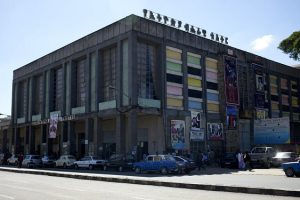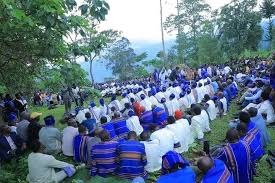
As we said earlier in another context, culture is a broader and holistic concept that includes politics, economics, history and other related disciplines, including culture. Thus we have what we call the culture of peace as clearly defined nowhere else more than in the global covenant following the establishment of the United Nations.
As defined by the United Nations, “The Culture of Peace is a set of values, attitudes, modes of behavior and ways of life that reject violence and prevent conflicts by tackling their root causes to solve problems through dialogue and negotiation by individuals.” This is however easier said than done as the ways of achieving or implementing a culture of peace have already proved extremely difficult unless the psychological, emotional and sentimental conditions are conducive to the emergence of a genuine movement for global culture of peace.
According to studies conducted in this area, “A Culture of Peace includes being in peace with oneself, others and the natural world. The primary tool to promote a Culture of Peace is Peace Education, which must be taught in families, all levels of education, workplaces, and disseminated through the media, and encouraged at all levels of society.”
These pronouncements look extremely simple and easily attainable and yet their implementation requires herculean efforts judging by past experiences.
At the global level, conflicts may be prevented or resolved whenever they turn deadly, with a global and effective Peace Movement that would impact the attitudes of the conflicting parties long before a cold war turns into a hot one. This is the most important factor that has allowed the actors to seek for emotional rather than rational solutions long before the conflicts turn deadly. Even after hostilities start, outside players need to keep cool heads and seek balanced, responsible and feasible solutions instead of taking sides that only exacerbate the situation.
According to the latest information, the African Union Secretariat last week expressed its concern for the speedy end of the new war dubbed in the international media as the Israeli-Hamas war. AU Secretary General Mussa Faki Ahmed has conveyed to the world a rather unemotional, balanced, measured and genuine concern to the people of both Israel and Palestine and the leaders of the two entities to enter into dialogue to address the roots causes of the present conflict that is threatening the world with dangerous expansion or escalation.
Africa has recently displayed diplomatic verve and political acumen in trying to mediate the Russian-Ukraine war as well as other conflicts around the world. The diplomatic maturity of the AU was evident when South African President Ceryl Ramaphosa tried to mediate for a peace deal between Russia and Ukraine without taking sides as it is often the case with great powers that support one side against the other depending on their national and geopolitical interests.
Although it is a relatively less developed part of the world, Africa is currently better poised to try and make its real weight be felt in international affairs by following a diplomatic road least trodden even by nations with a long history and experience in diplomacy and international relations. Africa has therefore a better and realistic perspective on global peace and conflicts because it has itself been a victim of great power policies during the colonial era and it is presently the only continent that is not actively and openly disputed as an object of great power hegemony.
Last and but not least, Africa is not a continent that is struggling to develop and not a continent that pursues ambitious plans in other parts of the world. Africa as a developing continent is better committed to the prevalence of peace in the world because conflict in one part of the world would sooner or lesser impact its hopes and dreams. Africa has never been a source of global or regional conflict while most continents have been engaged in hegemonic conflicts that claimed millions of lives.
For this and other reasons, Africa has a better chance of generating ideas that benefit world peace both for its own development and useful for regional and global peace. The only shortcoming in Africa is its failure to deal with its own internal conflicts effectively and seek outside help to achieve collective security. This does not however prevent it from working for its own and for world peace because the two are organically linked and their solutions can only be applicable in internal as well as external situations. Global peace is unimaginable without Africa’s active participation and contribution while Africa’s peace cannot be guaranteed without international peace.
The culture of peace in the world was born in the aftermath of WWII at a moment when the horrors humanity went through during the last war were still fresh in its collective consciousness. People scrambled to establish peace movements and build memorial to the fallen of past atrocities in their bid to warn the world that it should work harder to avert hell from engulfing us again.
“Never Again!” was the leading refrain that was reflected in politics, the arts and in the then barely emerging global peace movement. The nascent peace movement, was expressed in a series of peace actions everywhere on the five continents and they had the objective of, “seeking to achieve ideals such as the ending of wars or minimizing inter-human violence in a particular place or situation.”
The history of the global peace movement dates back to the end of WWII. According to available information, “The history of peace movements started with peace societies in the USA and in England between 1814 and 1816. France and Switzerland followed in 1821 and 1830 respectively with the majority of European countries only after 1850.”
When we look at the situation in the post-WWII, we realize that, “during the post-war occupation, a peace movement grew out of the suffering caused by nuclear weapons. The Bikini Incident in 1954 catalyzed a great expansion of these actions. In august the following year, the First World Conference against Atomic and Hydrogen Bombs was held in Hiroshima.”
Subsequent to these events, a global peace movement gained momentum as the wars raged in Korea, China, Vietnam and in other countries that came under the common name of Indochina. This was in turn followed by other peace movements in the 2960s and 1970s in countries where governments pursued aggressive policies and hegemonic ambitions that were made evident after the end of WWII with the newly emerging geopolitical realties of a world dominated by the then superpowers. For instance, what is known as the Peace History Society, “was established 1964 to encourage and coordinate national and international scholarly work to explore and articulate the conditions and causes peace and war, and to communicate the findings of scholarly work to the public.”
More than any time since the dawn of the 21st century, the world is now facing the possibility of going into a global inferno once again after witnessing less than 80 years of relative world peace punctured by smaller wars in Vietnam and Indochina, near misses in Cuba in 1960, and permanent bloodshed in the Middle East. Nowadays, the realities of conventional wars are becoming more and more rearing their ugly heads while the world is inching closer to nuclear catastrophe or the possibility of conventional wars turning into deadlier nuclear conflagrations.
The end of WWII had given rise to a powerful global movements like the creation of the United nation as a beacon of world peace. Whether the UN has lived up to its mission of keeping world peace and preventing another global conflagration might be something highly debatable although it has so far prevented the eruption of another a third world war. This is no mean achievement in a world packed with nuclear warheads and increasingly destructive arsenals of mass annihilation at a global scale. The race for acquiring nuclear weapons is still continuing at a breakneck speed as if humanity has an appointment with mutually assured destruction. A new regional conflict is coming on top of an older one.
While humanity is still wrestling with the specter of a possible nuclear annihilation in Europe with the Russia-Ukraine war deepening instead of showing any sign of abetting, the danger of a new regional war is rearing its ugly head with the ongoing Israel-Hamas war that has all the ingredients for growing into a bigger conflict with the possibility of major regional powers taking sides and threatening to get involved in an unexpected conflict that has already claimed thousands of lives in a couple of weeks.
The need for launching a worldwide peace movement should therefore become the most urgent item on the global agenda. The world is apparently inching closer to a global conflagrations in Europe, the Middle East, Asia and of course Africa. Many people are talking about the possibility of WWIII erupting anytime soon as the future is becoming more and more unpredictable and as the possibility of a single spark starting a prairie fire is looming large in this troubled world. One conflict in one part of the world is followed by another in other parts of the world.
On the other hand, the weight and capacity of international institutions to resolve these conflicts are rather decreasing. In this dangerous context, it would be palatable to launch a new international peace movement that would put pressure on national governments, non -state actors and international institutions. Such a movement should put pressure on the traditional actors and boldly work for the preservation of peace and defend humanity in the face of mounting belligerence. It should be launched is such a way as to stop all wars, achieve irrespective of race, color, ethnicity and economic conditions. It may not be too late but not impossible to start such a peace movement. Better try late than never as the saying goes.
BY MULUGETA GUDETA
THE ETHIOPIAN HERALD WEDNESDAY 25 OCTOBER 2023





